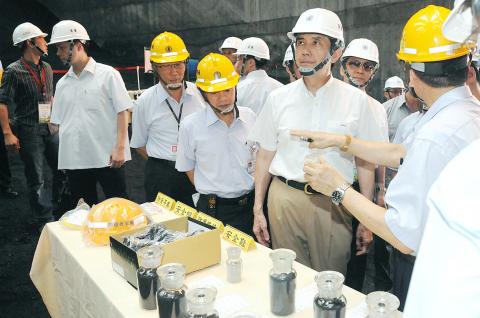President Ma Ying-jeou (馬英九) yesterday led a group of senior officials and reporters on an “energy tour” in an effort to raise awareness of the challenges facing Taiwan’s energy sector, but the visit was momentarily delayed after the most powerful earthquake so far this year struck in Nantou County.
Ma and the delegation were en route to the Ma-anshan Nuclear Power Plant in Ma-anshan (馬鞍山), Pingtung County, when the earthquake struck Nantou County’s Renai Township (仁愛).
Following the quake, Vice Premier Mao Chi-kuo (毛治國) took early leave of the tour.

Photo: CNA
Ma told the press that Mao was returning to Taipei to handle post-earthquake affairs, adding that Mao had also instructed Minister of the Interior Lee Hong-yuan (李鴻源) to lead the Central Disaster Response Center.
Meanwhile, Premier Jiang Yi-huah (江宜樺), who was part of the group, said the government hopes the two-day visit will improve the public’s understanding of the administration’s energy policy.
The information obtained during the tour could be factored into the nation’s deliberations on whether to complete the Fourth Nuclear Power Plant in New Taipei City’s (新北市) Gongliao District (貢寮), he said.
The fate of the project, under construction since 1999, is expected to be decided in a national referendum, likely to be held before the end of the year.
On the first day of the energy tour, officials and senior journalists visited a liquefied natural gas terminal, a coal-fired power station and a solar power station, all of which are located in Greater Kaohsiung.
The group was to spend last night in Pingtung County, before visiting the Fourth Nuclear Plant today.

MAKING WAVES: China’s maritime militia could become a nontraditional threat in war, clogging up shipping lanes to prevent US or Japanese intervention, a report said About 1,900 Chinese ships flying flags of convenience and fishing vessels that participated in China’s military exercises around Taiwan last month and in January last year have been listed for monitoring, Coast Guard Administration (CGA) Deputy Director-General Hsieh Ching-chin (謝慶欽) said yesterday. Following amendments to the Commercial Port Act (商港法) and the Law of Ships (船舶法) last month, the CGA can designate possible berthing areas or deny ports of call for vessels suspected of loitering around areas where undersea cables can be accessed, Oceans Affairs Council Minister Kuan Bi-ling (管碧玲) said. The list of suspected ships, originally 300, had risen to about

DAREDEVIL: Honnold said it had always been a dream of his to climb Taipei 101, while a Netflix producer said the skyscraper was ‘a real icon of this country’ US climber Alex Honnold yesterday took on Taiwan’s tallest building, becoming the first person to scale Taipei 101 without a rope, harness or safety net. Hundreds of spectators gathered at the base of the 101-story skyscraper to watch Honnold, 40, embark on his daredevil feat, which was also broadcast live on Netflix. Dressed in a red T-shirt and yellow custom-made climbing shoes, Honnold swiftly moved up the southeast face of the glass and steel building. At one point, he stepped onto a platform midway up to wave down at fans and onlookers who were taking photos. People watching from inside

Japan’s strategic alliance with the US would collapse if Tokyo were to turn away from a conflict in Taiwan, Japanese Prime Minister Sanae Takaichi said yesterday, but distanced herself from previous comments that suggested a possible military response in such an event. Takaichi expressed her latest views on a nationally broadcast TV program late on Monday, where an opposition party leader criticized her for igniting tensions with China with the earlier remarks. Ties between Japan and China have sunk to the worst level in years after Takaichi said in November that a hypothetical Chinese attack on Taiwan could bring about a Japanese

STREAMLINED: The dedicated funding would allow the US to transfer equipment to Taiwan when needed and order upgraded replacements for stockpiles, a source said The US House of Representatives on Thursday passed a defense appropriations bill totaling US$838.7 billion, of which US$1 billion is to be allocated to reinforcing security cooperation with Taiwan and US$150 million to replace defense articles provided to the nation. These are part of the Consolidated Appropriation Act, which the US House yesterday passed with 341 votes in favor and 88 against. The act must be passed by the US Senate before Friday next week to avoid another government shutdown. The US House Committee on Appropriations on Monday unveiled the act, saying that it allocates US$1 billion for the Taiwan Security Cooperation Initiative